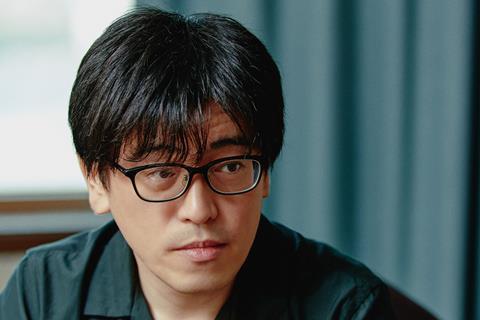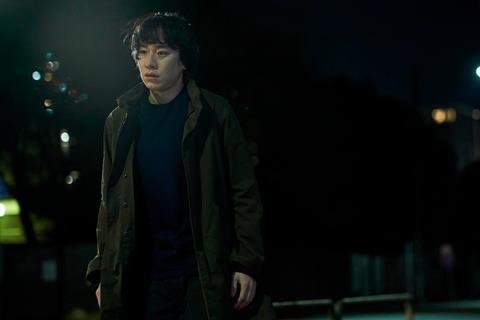
Whale Bones, the latest film from director and screenwriter Takamasa Oe, received its world premiere at the Bucheon International Fantastic Film Festival (Bifan) in the festival’s top Bucheon Choice section.
It marks the first project from the Japanese filmmaker since Drive My Car, which he wrote alongside director Ryusuke Hamaguchi. Oe also served as chief assistant director on Drive My Car, which won best screenplay at Cannes in 2021 and best international feature film at the Academy Awards.
The success of that film, Oe tells Screen, gave him the chance to make Whale Bones, a project he had been trying to get off the ground for a decade.
“Films like this don’t tend to get funded in Japan,” says Oe. “Depending on how you direct it, you could make it into a more ‘commercial’ project, but I didn’t want to do that, which meant no money. Getting funding was thanks to Drive My Car, no doubt about it.”
Whale Bones centres on a young man named Mamiya (Motoki Ochiai), whose desperation for companionship leads him to a dating app where he meets a high school student named Aska (Ano). Mamiya brings her home and, emerging from a shower, finds her dead. In a panic, he rushes to dispose of her body, but it suddenly disappears. Later, he discovers that Aska is a popular figure on a social augmented reality app with passionate and potentially dangerous followers.
The idea for the film, co-written with screenwriter Kaito Kikuchi, came when AR apps were first gaining popularity in Japan.
“I thought AR would be a great fit for a film,” says Oe. When people leave their memories behind in video form on such an app, says the director, “it’s almost like they’re ghosts,” giving Whale Bones a tone that combines magical realism with tech horror.
In crafting his enigmatic lead character, Oe says he wanted to create a kind of “blank slate” who serves as the “camera” through which the audience watches the film.
“The rule I created for myself was to shoot only the things that Mamiya sees and feels. I wanted to take the audience on a ‘magical realist’ trip through the mysterious, creepy world of night-time Japan, and I thought a character like this would be the way to do it.”

The most important note Oe gave to lead actor Ochiai, he says, was that his character is “simultaneously a perpetrator, a victim, and a witness.” Oe likens this to using a social media platform like Twitter: “You’re only there to look at things, but by tweeting something like, ‘I had a great day,’ you may actually end up hurting someone, and you yourself might be hurt by reading such a post.”
The film also comments on social media through a supporting character who, over the course of the story, flits from app to app seeking fame.
“I wanted her to represent someone extremely modern,” says Oe. “Meaning someone who’s able to absorb new things and change herself. She has no ideology, for better or worse. She’s willing to use any kind of app to become popular. She’ll definitely succeed, but despair may also be awaiting her in the future.”
While Whale Bones depicts the pitfalls of social media, Oe is not wholly negative about its potential. In the film, the fictional AR app Mimi, originally created as a place for users to criticise others, becomes an important space for communities as a result of its users.
“Users have the potential to remake apps, to change the way they’re used for the better,” says the director.
Apropos of modern technology, Oe says that the film’s eerie soundtrack, composed by Takuma Watanabe, features motifs written by AI that were then refined by Watanabe.
“It created an indescribably strange feeling,” says the director. “To me, it felt like a combination of digital and analogue, something that sounded like it came from the depths of the sea. It added a lot to the film.”
Whale Bones clocks in at 88 minutes, a choice that Oe says was very deliberate.
“My first draft of the script would’ve come to about two-and-a-half to three hours,” says Oe. “But over time, I started to realize this was a genre film, albeit one that switches genres several times throughout. I think of genre films as being about 80 minutes, so I did my best to compress it down to 80 minutes, and ultimately ended up at 88.”
Oe’s next project as screenwriter is the Japanese Disney+ original series Dragons Of Wonderhatch, a fantasy that combines live-action and animated sequences. Oe says he spent more than a year on the project, creating the backstory for the world of the series, which involves islands that float in the sky, as well as writing the scripts.
The writer/director is also looking for funding for his next original project and is interested in developing projects outside of Japan.















![[L-R]: Amanda Villavieja, Laia Casanovas, Yasmina Praderas](https://d1nslcd7m2225b.cloudfront.net/Pictures/274x183/6/4/1/1471641_pxl_20251224_103354743_618426_crop.jpg)









No comments yet